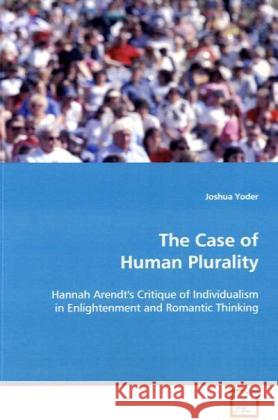The Case of Human Plurality : Hannah Arendt's Critique of Individualism in Enlightenment and Romantic Thinking » książka
The Case of Human Plurality : Hannah Arendt's Critique of Individualism in Enlightenment and Romantic Thinking
ISBN-13: 9783639056099 / Angielski / Miękka / 2009 / 156 str.
The Case of Human Plurality : Hannah Arendt's Critique of Individualism in Enlightenment and Romantic Thinking
ISBN-13: 9783639056099 / Angielski / Miękka / 2009 / 156 str.
(netto: 251,34 VAT: 5%)
Najniższa cena z 30 dni: 264,53
ok. 10-14 dni roboczych
Bez gwarancji dostawy przed świętami
Darmowa dostawa!
In looking for an answer to the utter disregard forhuman life she witnessed during the Holocaust, HannahArendt found herself drawn to the ideas ofindividualism developed in Enlightenment and Romanticthinking. She wanted to understand how these ideasmight have contributed to the problems she saw formodern society and politics. Ultimately, sherejected the Enlightenment concept of an abstract manbecause she saw it as nothing more than a phantomconcept, with no basis in reality. But she alsorejected the notion of an introspective self found inRomantic thought, where reality is given meaning onlythrough self-consciousness. At the center ofArendt's thought is the idea that human beings existas a plurality, that we exist together with eachother and not just as a groups of individuals. Sheaccuses the twin concepts of an abstract man andintrospective self of trying to replace humanplurality with radical individualism. For Arendt,such thinking is detrimental to the very foundationof politics. Politics cannot exist, she argues,without human plurality. Arendt wants to rescue thenotion of human plurality and elevate it to a primalposition in Western thought.











